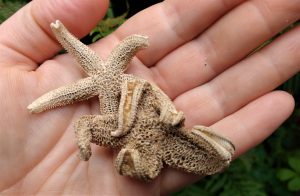 … Nobody brings anything small into a bar round here.
… Nobody brings anything small into a bar round here.
One of the lines which convinced me about Tom Waits; and I remain convinced, despite the discovery that the line was lifted more or less verbatim from Harvey. In the film, Elwood P Dowd also claims ‘I’ve wrestled with reality for 35 years… and I’m happy to state I finally won out over it’. I went to the beach, this day, feeling that reality had definitely won out over me—more TS Eliot and a reality overdose than Jimmy Stewart and an escape from it. But maybe people rarely bring anything small to the sea, either.
After Meeting, Suan and I began the schlep over to Silecroft, on the Cumbrian coast. If you live in Kendal you really have to want to go to the beach. Those who inhabit a more Londocentric Britain might be surprised to learn you can get a long way further on than Kendal, Windermere or Keswick. You really can. And whatever the crow might make of it, the journey by car takes a good while, on minor roads which have you tacking to and fro with the needle hitting around 40mph, tops. Not that Suan’s car was exactly begging to be let off its leash: a sort of mobile shed with a now-(thank-goodness)-dried-out passenger seat (leaky seal fixed), it doesn’t so much cruise as proceed, like a policeman or a dowager duchess. But it gets the job done.
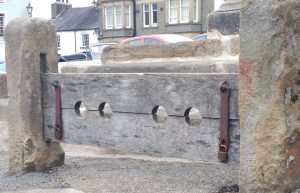 We stopped for lunch in Broughton-in-Furness, a small market town which has a charming Georgian square with large chestnut trees and a set of stocks (well, why not? I have some nominees…). The café staff were warm, lovely and willing to have a bit of a crack with their customers, which is always a delight; and though my omelette could have doubled as footwear if I hadn’t already been wearing sandals, still it was a great place to have lunch because it was so very much not a chain, every-meal-looks-the-same-on-every-continent, establishment. Slightly odd, and not in a self-consciously trendy way. It had personality, and that goes a long way.
We stopped for lunch in Broughton-in-Furness, a small market town which has a charming Georgian square with large chestnut trees and a set of stocks (well, why not? I have some nominees…). The café staff were warm, lovely and willing to have a bit of a crack with their customers, which is always a delight; and though my omelette could have doubled as footwear if I hadn’t already been wearing sandals, still it was a great place to have lunch because it was so very much not a chain, every-meal-looks-the-same-on-every-continent, establishment. Slightly odd, and not in a self-consciously trendy way. It had personality, and that goes a long way.
And so did we, it seemed—though it’s only about another 8.5 miles from there to Silecroft, it felt like further. Like my stomach, my heart was full, as I said, of all sorts of indigestible reality. I’m not sure if it’s about the run-up to my birthday, or because precious people have not been very well, and a friend has just had some longed-for twins, and I’ve got a few ongoing aches-and-pains to remind me that this body of mine has been in use now for nearly 51 years… Whatever the reason, I’ve been full of thoughts about ageing and mortality, my lack of +1 and 2.4 and the consequent dearth of long-term-shared history, and about what legacy I may leave in the absence of children (and indeed money!). Big, difficult thoughts: the kind of stuff which led to what the afternoon knows in the first place. As I’d hoped, embarking on the fifty things has offered a lot of relief: there’s been so much richness and enjoyment, so much to be thankful for and rejoice in. But these last few weeks of sustained reconnection with my sorrows and fears have been tough going.
I was telling Suan about all this—there’s something about conversations in cars which can be so intimate—when I found my throat swelling with grief as I described the other thing about my birthday: it has been changed, forever, I think, by the fact that it was on that day, 6 years ago, that Dad was last present behind his eyes. He made such an effort to be there for me, with all of us, in that stuffy hospital room with its worn lino and wipe-clean chairs: so great an effort, in fact, that Mum, Susie and I left to have our lunch full of a wild, desperate hopefulness which was the definition of pathetic (‘arousing pity, especially through vulnerability or sadness’). Though he didn’t die for another few days, that was the last time we really saw each other; and as I left the room to go for lunch, I looked back, and saw him stop trying. I saw him let go. And I will never forget it.
So, thank goodness for friendship. All there is to do with that kind of grief or memory is tell it, feel it, and have it received. And it was received. CS Lewis describes friendship as ‘[the] kind of love… [where] Do you love me? means Do you see the same truths?’. What I need, when I’m struggling, is empathy, acknowledgement and acceptance. Knowing I was with someone who prizes those things as I do, I knew I was safe. No minimising, blanking or solution-mongering here. That’s as good as these things get.
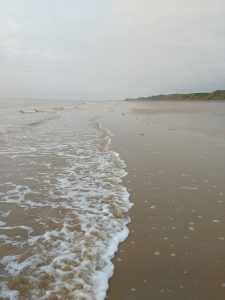 And in some strange anthropomorphic way I felt received by the sea, too. When we got there the tide was out: a stripe of stones and expanse of glistening sand were between us and the middle-distant water. We both wanted to walk straight towards it, rather than along, and soon had our shoes off and our feet making contact with the cool, wave-ridged sand; when I stood still, I could feel my heels sinking deeper. Mostly we paced and, moving at different speeds, soon separated, so that the nearly-empty beach stretching ahead offered me space and solitude with the reassurance of someone friendly still within sight, if I needed her. I’m sure Bowlby would have approved.
And in some strange anthropomorphic way I felt received by the sea, too. When we got there the tide was out: a stripe of stones and expanse of glistening sand were between us and the middle-distant water. We both wanted to walk straight towards it, rather than along, and soon had our shoes off and our feet making contact with the cool, wave-ridged sand; when I stood still, I could feel my heels sinking deeper. Mostly we paced and, moving at different speeds, soon separated, so that the nearly-empty beach stretching ahead offered me space and solitude with the reassurance of someone friendly still within sight, if I needed her. I’m sure Bowlby would have approved.
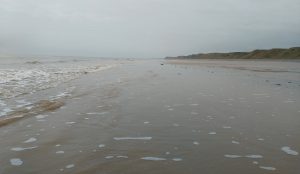 The small waves folded tidily over themselves, foaming gently as they flowed up the shore and sliding back down again in shallow sheets of clear, bubble-dotted water. Clumps of yellow-green seaweeds danced and undulated in the gentle surf, and scores of dead jellyfish were washed up on the sand, their beautiful colours undoubtedly easier to appreciate without the fear of involuntary contact with all that slithery gelatinousness. I wasn’t tempted to swim, but the water was temperate enough for paddling to be refreshing and lovely; and I walked a long way along the beach, ankle- and
The small waves folded tidily over themselves, foaming gently as they flowed up the shore and sliding back down again in shallow sheets of clear, bubble-dotted water. Clumps of yellow-green seaweeds danced and undulated in the gentle surf, and scores of dead jellyfish were washed up on the sand, their beautiful colours undoubtedly easier to appreciate without the fear of involuntary contact with all that slithery gelatinousness. I wasn’t tempted to swim, but the water was temperate enough for paddling to be refreshing and lovely; and I walked a long way along the beach, ankle- and 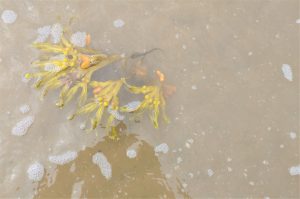 sometimes calf- deep in the blue-brown water, turning to face the sea occasionally when a bubble of sorrow came to the surface and needed to be released in tears. As it always will be, the sea was bigger than what I had to bring to it, and gradually the rhythm of the wave-noise and the empty expanse of the shore soothed me into a state of tired quiescence. Only my feet moved slowly, steadily, enjoying the alternating cool and warm of water and sand.
sometimes calf- deep in the blue-brown water, turning to face the sea occasionally when a bubble of sorrow came to the surface and needed to be released in tears. As it always will be, the sea was bigger than what I had to bring to it, and gradually the rhythm of the wave-noise and the empty expanse of the shore soothed me into a state of tired quiescence. Only my feet moved slowly, steadily, enjoying the alternating cool and warm of water and sand.
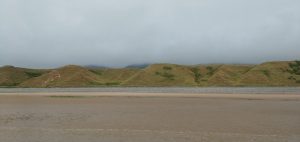 Eventually I headed up the beach to the stones and the strandline, where progress was more lurch-y and awkward but there were many things to look at. The bulk of Black Combe lay behind the beach, just a few fields away. Low cloud hid the fell-top from view, and cows were grazing beyond the sea-stone wall. Sea-kale was abundant and, with other shoreline plants, softened the interface between field and beach. I collected a bagful of plastic but saw other, happier things too: a cuttlefish, a section of fairly substantial fish-spine,
Eventually I headed up the beach to the stones and the strandline, where progress was more lurch-y and awkward but there were many things to look at. The bulk of Black Combe lay behind the beach, just a few fields away. Low cloud hid the fell-top from view, and cows were grazing beyond the sea-stone wall. Sea-kale was abundant and, with other shoreline plants, softened the interface between field and beach. I collected a bagful of plastic but saw other, happier things too: a cuttlefish, a section of fairly substantial fish-spine, 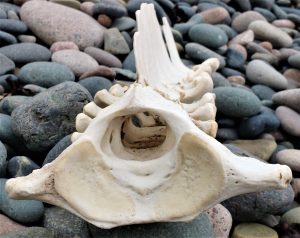 some tiny, perfect, dried starfish. Suan and I met again, compared treasures, and headed back to the portacabin café where the sun came out in time to make an ice-cream seem like a good idea. A last sit on a bench and then, back to the car, aware of the salt-taste of my lips and the relaxed tiredness in my limbs. Even the journey home was part of the satisfaction: another day’s shared history laid down. A usual thing, perhaps, for those with families; but for me, all part of something undramatic but very important.
some tiny, perfect, dried starfish. Suan and I met again, compared treasures, and headed back to the portacabin café where the sun came out in time to make an ice-cream seem like a good idea. A last sit on a bench and then, back to the car, aware of the salt-taste of my lips and the relaxed tiredness in my limbs. Even the journey home was part of the satisfaction: another day’s shared history laid down. A usual thing, perhaps, for those with families; but for me, all part of something undramatic but very important.
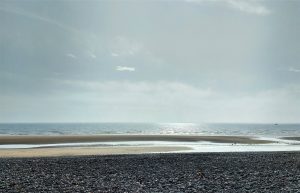
*You can read the poem from which this post’s title is taken here. I don’t relate to most of it, which is why I haven’t put it in the anthology. But I do think the line I used in the title is a great one.
**For a wonderful poem about the sea, and an equally wonderful musical setting of it, have a look here.
Thank you Lucy, and for the sea poem. I am even more excited about the sea shanty workshop at Shrewsbury Folk Festival now!
Sea shanty workshop? That sounds most unusual. Shall look forward to hearing about that! X